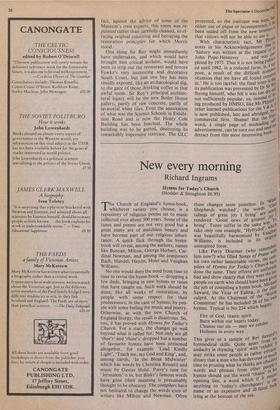New every morning
Richard Ingrams
Hymns for Today's Church (Hodder & Stoughton £6.95)
rrhe Church of England's hymn-book, 1 whichever variety you choose, is a repository of religious poems set to music collected over about 300 years. Some of the tunes and poems are not very good but a great many are of matchless beauty and have become part of our religious inheri- tance. A quick flick through the hymn- book will reveal, among the authors, names like Bunyan, Milton, George Herbert, Car- dinal Newman, and among the composers Bach, Handel; Haydn, Hoist and Vaughan Williams.
No one would deny the need from time to time to revise the hymn-book — dropping a few duds, bringing in new hymns or tunes that have caught on. Such work should be done, like all works of restoration, by people with some respect for their predecessors; in the case of hymns, by peo- ple with some feeling for music and poetry. Otherwise, as with the new Church of England liturgy, the result is disastrous. So, too, it has proved with Hymns for Today's Church. For a start, the changes go well beyond what is called for. Not only are all 'thee's' and 'thine's' dropped but a number of favourite hymns have been jettisoned altogether, for example 'Lead Kindly Light', 'Teach me, my God and King', and, among carols, 'In the Bleak Midwinter' which has words by Christina Rossetti and music by Gustav Hoist. Parry's tune for 'Jerusalem' is in, but Blake's famous words have gone (their meaning is presumably thought to be obscure). The compilers have not hesitated to change the words even of writers like Milton and Newman. Often
was beautifully harmonised by Vati,gi-eal Williams, is included in its ong" tidings of great joy I bring' are /ley') rendered 'Good news of greatest .in),Tro Shepherds watched', the words bring'. Tunes suffer in the same waeli take only one example, 'Hyfrydor, vi';;9/1 these changes seem pointless. In 'W,11,,lide uninspired form. mLike how;erwcyh Dfielaierdm Songs hoof preranrwbeimirbs. his own rather lamentable verses, the cob. his of Hymns for Today's Church ly done the same. Their efforts are urlif°1.°1d bad and show clearly that they were the L'en people on earth who should have been g,tvaei the job of compiling a hymn book- Mic'„7,ef Saward, the Vicar of Ealing, is the c".‘15 culprit. As the Chairman of the `W°I.vie Committee' he has included 26 of his ° hymns. Typical is No 234 which begins:
Fire of God, titanic spirit Burn within our hearts today:
r every —w may we exhibit H Cleanse oli n e ss our y ad This gives us a sample of Rev Saw kis hymnodical skills. Quite apart front. it audacity in rhyming 'spirit' with 'exhibitor. may strike some people as rather extra dinary that a man who has devoted so Ice time to pruning what he thinks are nbs°„ie,s words and phrases from other POI" his hymns should use the word 'titanic' in ns opening line, a word which if it ine3the anything to `today's churchgoers' is name of an expensive and ill-fated hu lying at the bottom of the sea.










































 Previous page
Previous page